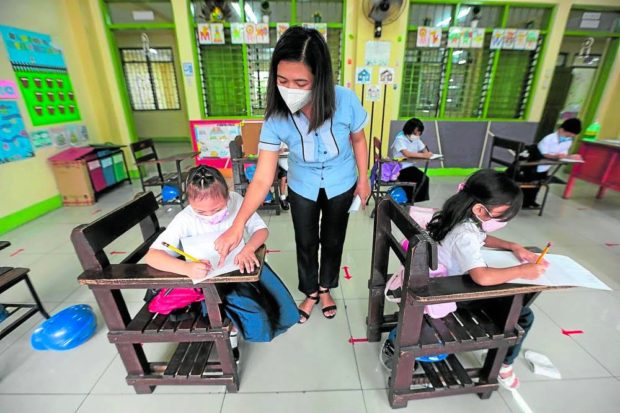Balisacan urges Sara Duterte: Resume face-to-face classes

FILE PHOTO: A teacher and her students learn together at the Pedro Cruz Elementary School in San Juan City as it reopened its face-to-face classes on Thursday, February 10, 2022. INQUIRER/GRIG C. MONTEGRANDE
Manila, Philippines — Just like his predecessor, Socioeconomic Planning Secretary Arsenio Balisacan on Monday urged the Department of Education (DepEd) to resume face-to-face classes in August, or else risk the future Filipino labor force lagging behind those of its neighbors.
With the new Education Secretary, Vice President Sara Duterte, at the helm of DepEd, Balisacan was optimistic that long-term scarring inflicted by the prolonged COVID-19 on the education sector will be addressed.
“What’s the cost to our economy, to our society, to our children, to the human capital vis-à-vis the cost of that risk of infection? … And it’s clear that our hospitals show that we can manage the risk at this point. And so there’s no reason why we should not open up the schools,” Balisacan told a press briefing after the turnover ceremony with former National Economic and Development Authority (Neda) chief Karl Kendrick Chua.
Chua, Balisacan’s predecessor at Neda, had been pushing to dismantle lingering restrictions on in-person classes, as the state planning agency’s projections had shown that a school year when students were unable to attend face-to-face classes would inflict P11 trillion in productivity losses across a 40-year period of a person’s working life span.
In the case of the Philippines, students had been under hybrid or mostly online classes these past two years, which the World Bank had said likely aggravated learning poverty in the country.
“The cost of that scarring on human capital is not going to affect us now, but it’s going to affect the future of our children,” Balisacan said.
“When they join the labor market five to 10 years from now, they will not be as competitive as our neighbors, who have already opened up, and provided better access to [education],” Balisacan added.
“This pandemic has been so inequitable; it has exacerbated the inequality of opportunities in education. So we should reduce and address that inequality,” the Neda chief said.
